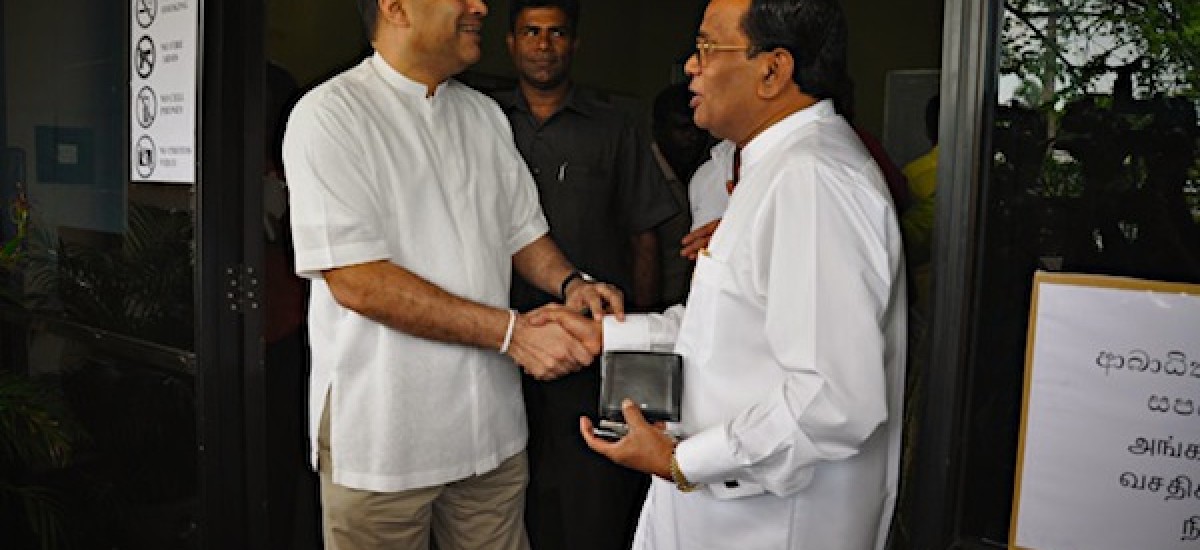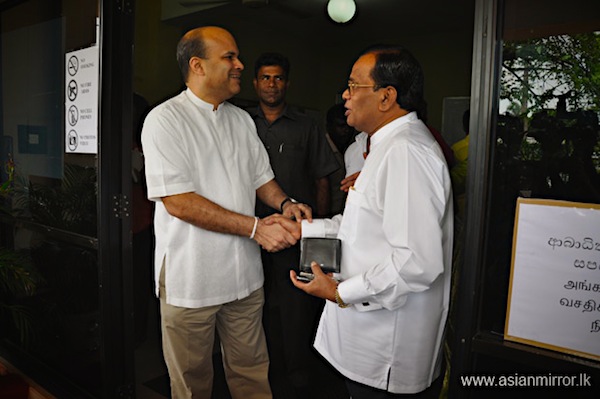Photo from Asian Mirror
In Open-source policy formulation for Sri Lanka’s capital, an article published on the Lanka Business Online website recently, the Head of the Policy Planning Group, Milinda for Mayor Campaign and renowned policy analyst Prof. Rohan Samarajiva looks at how mainstream politics can be made more participatory. The promise is of a direct democracy model with the aid of web, mobile and Internet technologies. Prof. Samarajiva captures well the shortcomings of a traditional approach to manifestos and public policy,
“The traditional approach is to rely on expertise. Experts formulate policy. Other experts debug it. Not very different from what goes on at the Redmond Campus of Microsoft.”
It is a beguiling vision. Co-creating public policy transparently is infinitely better than codifying in closed groups. This is the Wikipedia model, adapted to fit a political campaign. Experts, like Prof. Samarajiva, assume a curatorial role in the campaign – sifting through citizen-generated ideas, refining and combining them to create a representative and responsive policy framework. Seeing a coherent vision and a participatory model, citizens feel empowered and join the debates. In fact, Prof. Samarajiva notes many from Colombo and elsewhere already have. Even at face value, this is not something we’ve seen in elections held previously. Bitter invective and partisan rhetoric often inform campaign propaganda. Prof. Samarajiva promises something very different, both during the campaign and also in the model of governance were his candidate to win.
This is the ideal. What is the reality? A general critique of citizen or user-generated content is that most of it is rather poor in expression and execution. Experts, as Andrew Keen in ‘The Cult of the Amateur’ argues, aren’t obsolete. In fact, they are wanted more than before to stem a tsunami of cute cat videos on YouTube, relationship woes on Facebook, celebrity chatter on Twitter and badly focussed holiday photos on Flickr. Opening up policy making doesn’t necessarily mean better policy-making. The majority of comments on the Facebook pages of candidates consists of a single adulatory line. Some ask for jobs. Others ask for help in setting up a business. Hardly ideas generation for better public policy.
The promise of ostensibly ‘opening up policy making’ can also mask entrapment of a different kind. Think Apple, the computer company. Apple offers beauty in simplicity. Its iconic software and hardware has a cult following because it’s visually compelling, encouraging prolonged use and exploration so long as Apple’s rules are followed. And there’s the rub. Examples of the company’s intolerance with developers and users who attempt to question it and go beyond its rules are legion. In sum, what Apple offers is something beautiful to own and look at in return for little or no space for transparency or critical questioning. Few of course realise this, because few see a need to move beyond what it offers, and promises to make available in the future.
Apply this to Colombo’s future. An open city is an attractive prospect – in the sense of open physical spaces as well as transparency in governance. The former is already a reality. The latter remains elusive. Walls are coming down. Trees are being planted. Yet we don’t know why walls are coming down, what will be built in their place or why trees are being cut only to grow others in their place. We are taken in by what we see and are promised, but the reality is that we are all hostage to rules hardwired into a system beyond reproach or easy public scrutiny. A far cry then from a meritocracy or democracy. For all the online public participation touted by Prof. Samarajiva, the real scope of engagement is woefully constrained. Worse, attempts to enlarge it are actively censored. Questions on ethics, principles and in particular, adherence to election laws go unanswered. Politely put and repeatedly asked via email, Twitter, Facebook and the plain old telephone service, candidates with a web presence and saying they are for transparency simply do not engage.
If the promise of ‘open-source policy making’ is to hold true, it’s not just hyped-up cosmetic engagement that matters. The model promised need to be the model employed. Current mayoral web campaigns fall far short in this respect. I’ve repeatedly asked the candidates, including Prof. Samarajiva’s preferred choice, to open up campaign financing and declare personal assets. Others on Twitter, Facebook and blogs have asked the same question. Revealingly, the campaigns have no response. Bizarrely, some even go to the extent of claiming that existing law, requiring all candidates to declare assets, is ‘hypothetical’.
Rather than a partisan response, here’s my suggestion. Hack all the Mayoral web campaigns. The suggestion isn’t to technically disrupt but systematically decry the lies by proactively and repeatedly engaging. If actively debarred from asking hard questions in official online fora of candidates, voters should redouble efforts to hold candidates accountable though their own online media. Many in Colombo have a Facebook and Twitter accounts. Use these to decode web propaganda. Use them to create new threads of conversations, spin-offs in online and mainstream media platforms that hold candidates and campaign staff accountable to the law, and what they promise. Engage in Tamil and Sinhala to ascertain the real limits of trilingual promises by a candidate’s campaign staff. Be active on official campaign websites. Post content and ask for responses. If censored or restricted, place the content in the public domain. Tweet to the candidates. Ask them hard questions. Debug the canned responses, often copied and pasted from campaign propaganda. Remind the candidates that breaking the law whilst promising accountability is plain hypocrisy. Remind the experts behind the candidates what open source really is – a process of production and development that promotes access to the end product’s source materials. Applied to an election campaign, if a candidate who promises change isn’t willing to open up his own campaign to public scrutiny, ask why he deserves a vote.
There is emphatically no need to be rude or even sarcastic. The questions are their own power. For the average citizen, these online conversations and unanswered questions are a vital public record. For the candidates, these are equally vital repositories of discontent and support, scepticism as well as hope. Hacking the campaigns now will help us elect a more accountable Mayor, and nail him to his promises. Engaging robustly now benefits us all by pointing the debates to not just what we want to see, but how we want to get there.
It asks us all to be the change we want to see.
###
Authors note: A version of this article first appeared in the Sunday Leader on 25 September 2011. Also read Milinda Moragoda: The gap between promise and reality.


